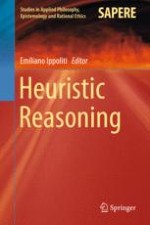2015 | OriginalPaper | Buchkapitel
Heuristic Appraisal at the Frontier of Research
verfasst von : Thomas Nickles
Erschienen in: Heuristic Reasoning
Aktivieren Sie unsere intelligente Suche, um passende Fachinhalte oder Patente zu finden.
Wählen Sie Textabschnitte aus um mit Künstlicher Intelligenz passenden Patente zu finden. powered by
Markieren Sie Textabschnitte, um KI-gestützt weitere passende Inhalte zu finden. powered by
